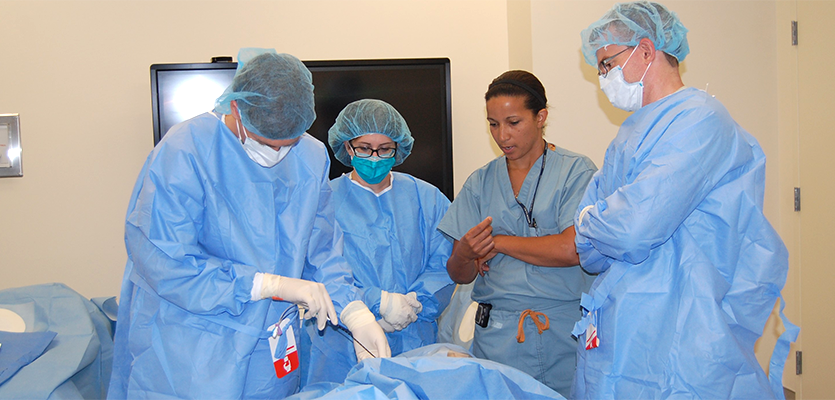Curriculum

The concept of progressive, supervised responsibility is closely followed and is considered the core of the surgical curriculum. The residency utilizes the Association of Program Directors in Surgery Surgical Resident Curriculum as its basic curriculum document. All residents are required to review the goals and objectives for each rotation prior to its initiation.
Resident training focuses primarily on the principal areas of general surgery, including: head and neck, skin, soft tissue and breast, alimentary tract, abdomen, endocrine, general vascular, thoracic, pediatric and trauma surgery. Rotations are structured to assure the resident experience with general surgical conditions related to age group, gender and socioeconomic status. Surgical subspecialty, anesthesiology and interventional radiology exposure is also provided to complete the clinical rotations.
The entire chief year is spent in general surgery. Rotations in the final year are carefully adjusted to provide the best possible balance of clinical and operative experience.
Teaching Conferences
Formal teaching conferences are organized both by the department and by the individual participating hospitals.
- A city-wide surgical grand rounds is conducted weekly.
- Weekly morbidity/mortality conferences are held at each hospital with full faculty participation.
- A weekly surgical/science didactic session is conducted.
- Mock oral exams are administered to third, fourth and fifth year residents annually.
Journal clubs, tumor boards and a broad range of specialty conferences are conducted at individual hospitals. Teaching conference participation by residents is mandatory. Distinguished visiting surgeons are brought to Dayton three to four times a year. Lectures and teaching rounds are a prominent part of these visits.
Surgical Resident Education
The Brethen Center for Surgical Advancement in Robotics and Minimally Invasive Surgery, located at Miami Valley Hospital, is equipped with emerging technology to educate residents on a broad range of skills and simulation curricula.
Laparoscopic Training
The center houses multiple minimally invasive laparoscopic training systems for resident use to develop basic laparoscopic skills and become versed in advanced procedural training. A LapSim trainer also provides a virtual reality experience with real-time direct visual feedback to further develop surgical laparoscopic skills. Dedicated labs with protected time are offered to provide residents the opportunity to develop their laparoscopic skills.
Robotic Training
The Brethen Center is also equipped with a da Vinci® Si Surgeon’s Console and simulator to provide residents an opportunity to use an actual robotic console to practice their skills in a safe and structured environment. The console is equipped with a simulator to allow residents to hone robotic technical skills using virtual reality representations of instruments and skills exercises. All residents have the opportunity to complete the robotics curriculum and perform procedures in the primary role and console surgeon to receive a Certificate of daVinci Training in robotics.
Operative Skills Training
With access to one of the largest cadaver donor programs in the nation through the Wright State University Boonshoft School of Medical Anatomical Gift Program, our program provides residents numerous educational opportunities in the form of cadaveric labs. Through use of Minimally Invasive Surgery Cadaveric Labs, monthly Trauma Procedure Cadaveric Labs and regular recurring Advanced Surgical Skills for Exposure in Trauma (ASSET) courses, trainees gain experience and confidence in anatomic exposure and operative skills.
Critical Care Ultrasound Training
Residents also participate in our point-of-care critical care ultrasound course to broaden their skills in clinical assessment. Participants benefit from guided, hands-on skill stations, featuring live models to reinforce key learning points to broaden their skill-set for assessing critically ill patients.
Research
Integral to the mission of the Department of Surgery (DOS) is to provide outstanding scientific training to medical students and surgical residents. We are committed to support and increase the scope of research and scholarship by maintaining an environment of inquiry. Our residents and medical students join surgery faculty in pursuing a scholarly project in the area of basic science research, clinical research, education research and/or quality improvement studies and create or improve their academic portfolio during surgery residency. Further, we are committed to providing the foundation for an academic career through extensive research experiences including dedicated research time for those who wish to enter academic surgery. Annually, 1-2 residents in our program take research year between the PGY-2 and PGY-3 years. This yearlong research experience can be expanded to accommodate more if desired, and is available on an elective basis for military residents. These research experiences are typically with one of the surgery faculty but can be in other laboratories and can accommodate clinical research activities if appropriate.

